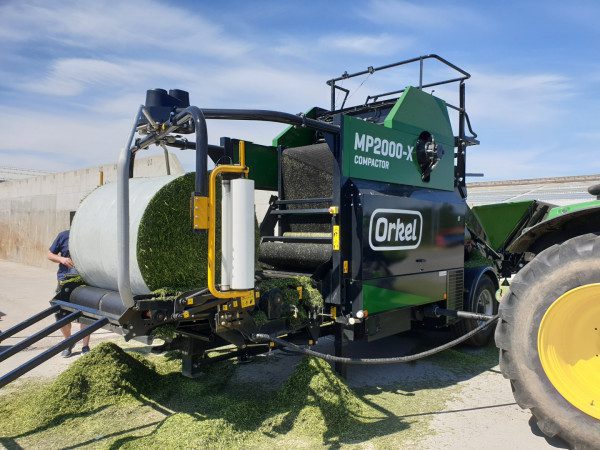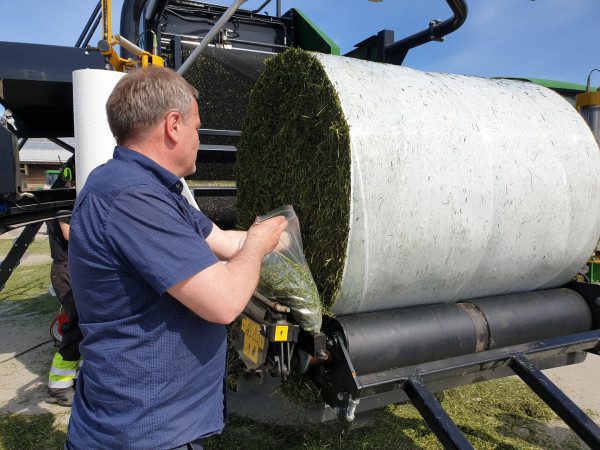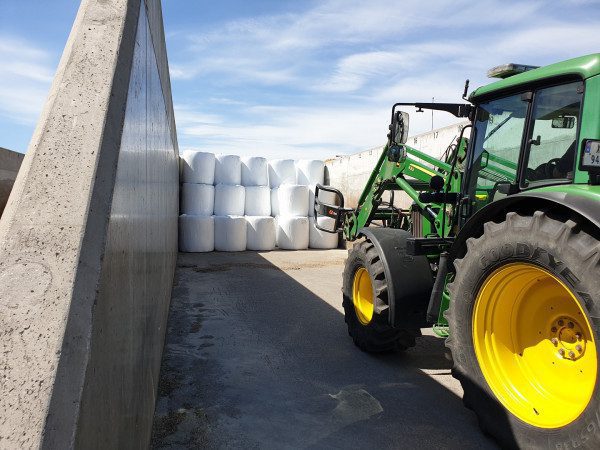After attaining a recycled alternative to virgin film, Orkel collaborates with The Livestock Production Research Centre to quality assure the product, uncovering that Orkel Recycled Film provides forage high nutrient preservation abilities.

Overseen by Orkel technicians, the baling also involved representatives from the SHF.
Quality assurance
Before considering launch, assuring the quality of our new product, Orkel Recycled Film, was the natural next step. The search for an external reference began, and shortly after one of our long-term research partners in The Livestock Production Research Centre expressed enthusiasm towards the proposition of testing Orkel recycled film.
The livestock production research centre
The Livestock Production Research Centre (SHF) is referred to as “Norway’s largest educational and research facility for fundamental and innovative research as well as practical solutions for sustainable and profitable livestock farming.” The Centre is a part of NMBU, being the Norwegian University of Life Sciences located in the South of Norway. Holding the position as Engineer of this center is Mr. Håkon Røed, who has familiarized himself with Orkel high-density bales from previously conducted tests. “On behalf of the SHF and its sustainability-emphasis, I was quite curious on testing the qualities of Recycled Film and how it affects the forage mix,” he exclaims.

NMBU, the Norwegian University of Life Sciences. Photo: Kai Ole Hansch
Conducting the forage testing with Orkel recycled film
The project was conducted over two days using an Orkel MP2000-X. Provided by the SHF, the material to be baled was short-chopped grass, consisting of approximately 30% dry matter. The team was blessed with optimal baling conditions as it was sunny, allowing drying conditions for the material before baling. Having both Orkel Recycled Film and ordinary virgin film available, the baling began.
Twenty high-density round bales
The baling process was overseen by Orkel technicians, with representatives from the SHF on standby for when the bales were ready for storage. Altogether, twenty high-density round bales were seamlessly made for the test project. After successful baling, conducted in June 2020, the bales were stored untouched for eight months before the first tests were extracted in February 2021 and again in April 2021.
High nutrient preservation!
Revisiting the bales in February 2021 revealed that the bales had held up nicely, despite being exposed to the natural elements outdoors. The bale wrappings were penetrated to collect forage tests and sent to the SHF’s testing facilities shortly after. To everyone’s excitement, the test results indicated no apparent difference in terms of appearance nor material nutrition levels when comparing forage wrapped with recycled film and forage in ordinary virgin film!
Low bacterial activity
Miriam Gjønnes Karterud, our Regional Sales and Sustainability Manager, forwarded the nutrition details to a specialist who could confidently claim there were no significant difference, as the result variables were minor. Alike the virgin film bales, the recycled film tests contained a level of lactic acid and a level of sugar content that indicated low bacterial activity, hence high nutrient preservation!
Essentially, the results indicated that the preservation differences were minimal to none, meaning that recycled film may offer an equal conservation quality to virgin film.

Sample extraction, assuring that the film posesses sufficient preservation abilities.
Evident Benefits for the Baling Industry
Based on the conducted tests, Mr. Røed expresses that he is optimistic to the recycled wrap. In addition to the assured quality, the wrap introduces added selection: “There are apparent benefits in providing different types of high-quality film, depending on the values of the customer (or researcher, in our case!)” We couldn’t agree more regarding it being a significant addition to the baling industry, especially due to the looming tax additions from the EU, which this product avoids.
Røed continues: “Using recycled film in round bales is optimal as it provides sufficient conservation for high-quality silage, especially for forage research and testing purposes this is of great interest.” This is absolutely the case, as it allows the user to collect and feed the exact amount of forage required, while the remaining forage bales to stay wrapped and protected against oxygen.
Sealing the product quality
By the expertise of The Livestock Production Research Centre, the benefits of Orkel Recycled Wrap were uncovered to the Orkel team’s excitement. Going forward, we now have the confidence to recommend this product to our customers as a more sustainable alternative, while confidently supporting the wrap’s abilities to assure nutrient preservation.
He finishes: “If you would like to conduct further research on the abilities and opportunities of the recycled film, bring it on!”

After baling, the round bales were stored untouched for eight months before handling.